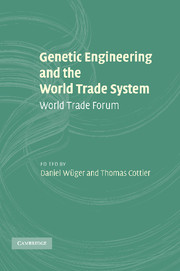Book contents
- Frontmatter
- Contents
- List of contributors
- List of abbreviations
- PART I Introduction and systemic issues
- PART II Intellectual property and gene technology: issues at stake and possible options
- 4 Biotechnology and patents: global standards, European approaches and national accents
- 5 Intellectual property rights, biotechnology and development: African perspectives
- 6 Traditional knowledge, biogenetic resources, genetic engineering and intellectual property rights
- PART III Food security, trade and agricultural production with genetically modified organisms
- PART IV Food safety, international trade and biotechnology
- PART V Medical research, cloning and international trade
- Index
6 - Traditional knowledge, biogenetic resources, genetic engineering and intellectual property rights
Published online by Cambridge University Press: 06 October 2009
- Frontmatter
- Contents
- List of contributors
- List of abbreviations
- PART I Introduction and systemic issues
- PART II Intellectual property and gene technology: issues at stake and possible options
- 4 Biotechnology and patents: global standards, European approaches and national accents
- 5 Intellectual property rights, biotechnology and development: African perspectives
- 6 Traditional knowledge, biogenetic resources, genetic engineering and intellectual property rights
- PART III Food security, trade and agricultural production with genetically modified organisms
- PART IV Food safety, international trade and biotechnology
- PART V Medical research, cloning and international trade
- Index
Summary
Introduction
The advent of patent law in the international legal arena has transformed one of the most important aspects of human relations related to the use and management of economic resources. The need to encourage scientific research and maximise the potentialities of human fantasy and creativity has led the international community to reach a global consensus on the recognition of legally protected exclusive rights in favour of the ‘authors’ of discoveries and inventions as a form of reward for their contribution to human development. Hence, there is no doubt that patent law represents a very powerful engine for social progress throughout the world. Its operation, however, is not immune from significant side-effects. Many traditional societies – whose model of life was mainly based on solidarity and sharing of common resources and knowledge – have been upset by the new rules of patent law, according to which single individuals retain exclusive rights of management and use of newly developed knowledge, making it available to the group only through a payment to its holder(s). These side-effects are exacerbated by the fact that the rules in question – although applicable in principle only to ‘new’ discoveries and inventions – are often used for appropriating knowledge that has been shared by a group from time immemorial. Because the specific characteristics of such knowledge were unknown to the general public, it may be easily misrepresented as ‘original’ and ‘new’.
- Type
- Chapter
- Information
- Genetic Engineering and the World Trade SystemWorld Trade Forum, pp. 118 - 148Publisher: Cambridge University PressPrint publication year: 2008

